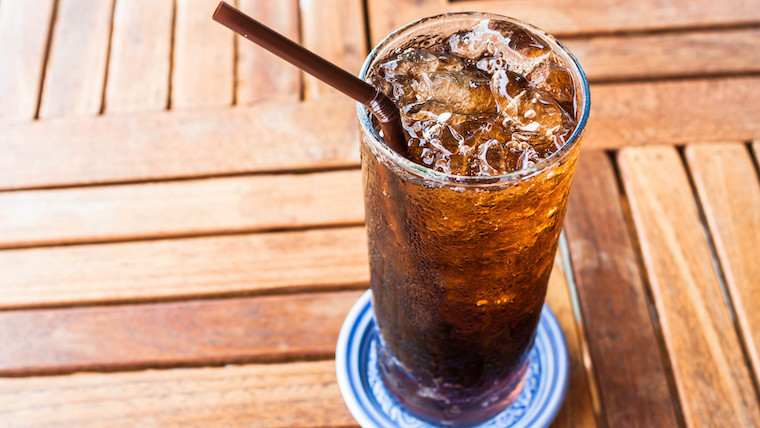With a 12-ounce can of Coca-Cola containing a whopping 39 grams of sugar, it’s long been understood that sweetened sodas will likely derail anyone’s weight loss journey as the 140 calories per can* — which should arguably say 156 calories per can instead since every carb contributes four calories. The positive or negative effects of diet sodas, however, have been the subject of much debate and study. Surely, when it comes to quenching thirst, water is best… right? Perhaps not always.
In a video published on Dr. Layne Norton‘s YouTube on Nov 16, 2023, Dr. Norton reviewed the latest research comparing diet soda and water. The often-cited common theory is that diet sodas act as a type of gateway, encouraging one to seek out further sweet tastes that might lead to piling on the calories through actual sugar intake. However, the research determines that is false. Real data tells all, so check out Norton’s breakdown of the research below:
*The high fructose corn syrup used in many sodas is calculated at 3.7 calories per gram instead of four per gram. Even by that standard, it would still equate to 144.3 calories, but foods over 50 calories are allowed to round to the nearest 10-calorie increment. (1)
[Related: 18 Ways to Eat More Protein to Pack on Muscle Mass]
Diet Soda vs. Water
The study, titled “Non-nutritive sweetened beverages versus water after a 52-week weight management programme: a randomised controlled trial,” looked at the effects of non-nutritive (artificial) sweeteners versus water as relates to weight loss and other markers. This research, carried out in the United Kingdom, began with 500 individuals who were placed into two groups:
- Group One — Must drink at least two sugar-free sodas per day.
- Group Two — Must drink at least two glasses of water per day.
Both groups were allowed to drink as much water and/or sweetened beverages as they chose to. However, they were provided with nutritional support and education to make sure they understood the effects of non-nutritive calories on their body weight. (2)

[Related: Dr. Layne Norton Explains New Study: You Don’t Need a Caloric Surplus To Build Muscle]
The Results
In what mind come as a surprise to most, the study found that “on average, the group consuming ‘the diet drinks’ lost a kilo and a half more weight than the group (only) consuming water,” explained Dr. Norton. That wasn’t the only area where diet beverages fared better than water.
Markers such as waist and hip circumference, blood pressure, liver enzymes, and cholesterol were all favorable in the diet soda division. Additionally, “There was one interesting point,” commented Dr. Norton as he parsed the data, “which wasn’t statistically different between groups because of the variants, but the group getting the non-nutritive sweeteners increased their step count on average by about 800 steps per day.” While that step count differential isn’t enough to explain the differences in weight loss alone, it is notable.
Diet Soda Helps With Fat Loss?
Dr. Norton believes the weight loss shown in this latest study can be attributed to the fact that those drinking diet sodas are probably consuming fewer calories overall than their water-drinking counterparts. “They’re getting that sweet taste from [diet soda], so perhaps they don’t feel the need to pursue it elsewhere,” Norton theorized. He was not advocating that people suddenly increase their diet soda intake, but he does believe diet sodas can be a valuable weight loss tool.
Not only did people lose more weight in the diet beverage group, they actually regained less weight when [the researchers] followed up with people [drinking] them.
Regarding the theory that diet sodas lead to craving sugar elsewhere, Dr. Norton cited in the 52-week study that there was no statistical difference in the participants’ levels of insulin resistance.
Validity of the Study
Importantly, Dr. Norton disclosed that this study was funded by the American Beverage Association but remarked that, in his professional opinion, this was a well-designed and well-executed study over a long, 52-week period. Additionally, the authors of the study retained the right to publish the results, whether or not they aligned with the hopes of the American Beverage Association or not. As Dr. Norton said, this is often not the case. The data was evaluated by an independent third party to ensure the appropriate controls and veracity of the results.
References
- (N.d.). Retrieved from https://www.fao.org/3/Y5022E/y5022e04.htm
- Joanne A Harrold, et al. Non-nutritive sweetened beverages versus water after a 52-week weight management programme: a randomised controlled trial. 2023 Oct 5; PMID: 37794246, DOI: 10.1038/s41366-023-01393-3
Featured image via Shutterstock/punsayaporn